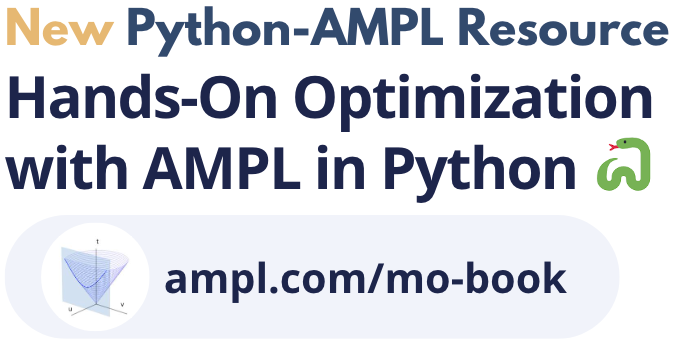ConstraintInstance#
- class ConstraintInstance#
The ConstraintInstance object stores the information regarding a specific instance of a costraint.
The instances can be accessed through the function Constraint.get of the parent
entity.
body()#
- classmethod ConstraintInstance.body()#
Syntax
v = body()
Description
v = body() Get the current value of the constraint’s body.
Output Arguments
vThe current body of the constraint.
Example
Create a constraint c (using AMPL.eval), get an instance and display its body.
ampl.eval('var x{i in 1..2} := i*0.9;');
ampl.eval('c{i in 1..2} : 0<= x[i] <= 5;');
c1 = ampl.getConstraint('c').get(1);
c1.body
gives:
ans =
0.9000
dual#
- classmethod ConstraintInstance.dual()#
Syntax
v = dual
Description
dual Get the current value of the constraint’s dual variable.
Output Arguments
vThe value of the dual variable corresponding to the constraint
Example
Create a constraint c (using AMPL.eval), get an instance and display its dual value.
ampl.eval('var x{i in 1..2} := i*0.9;');
ampl.eval('c{i in 1..2} : 0<= x[i] <= 5;');
c1 = ampl.getConstraint('c').get(1);
c1.dual
gives:
ans = 0
setDual(v)#
- classmethod Constraint.setDual()#
Syntax
setDual(v)
Description
setDual(v) Assigns the specified value to the dual variable. Valid only for scalar constraints. Equivalent to the AMPL code:
var x;
c: x<=5;
let c := v;
Input Arguments
vThe value to be assigned
Example
Create a constraint c and sets its dual value. We have to switch off AMPL presolve abilities to see the effect consistently.
ampl.setBoolOption('presolve', 0)
ampl.eval('var x;');
ampl.eval('c: x <= 20;');
c = ampl.getConstraint('c');
c.setDual(4);
c.dual
gives:
ans =
4
lb#
- classmethod ConstraintInstance.lb()#
Syntax
v = lb
Description
lb Access the current lower bound of the constraint.
Output Arguments
vThe lower bound of the constraint.
Example
Create a constraint c (using AMPL.eval), get an instance and display its lower bound.
ampl.eval('var x{i in 1..2} := i*0.9;');
ampl.eval('c{i in 1..2} : 0<= x[i] <= 5;');
c1 = ampl.getConstraint('c').get(1);
c1.lb
gives:
ans = 0
ub#
- classmethod ConstraintInstance.ub()#
Syntax
v = ub
Description
dual Access the current upper bound of the constraint.
Output Arguments
vThe upper bound of the constraint
Example
Create a constraint c (using AMPL.eval), get an instance and display its upper bound.
ampl.eval('var x{i in 1..2} := i*0.9;');
ampl.eval('c{i in 1..2} : 0<= x[i] <= 5;');
c1 = ampl.getConstraint('c').get(1);
c1.ub
gives:
ans = 5
drop#
- classmethod ConstraintInstance.drop()#
Syntax
drop
Description
drop Drop this instances of the constraint, corresponding to the AMPL code drop constraintname[index];.
Example
Create an indexed constraint c (using AMPL.eval) and drop one instance:
ampl.eval('var x{1..3}<=4;');
ampl.eval('maximize z: sum{i in 1..3} x[i];');
ampl.eval('c {i in 1..3} : x[i] <= i;');
x = ampl.getVariable('x');
ampl.solve;
x.display
ampl.getConstraint('c').get(2).drop
ampl.solve;
x.display
gives::
ans =
x [*] :=
1 1
2 2
3 3
;
ans =
x [*] :=
1 1
2 4
3 3
;
restore#
- classmethod ConstraintInstance.restore()#
Syntax
restore
Description
restore Restore this instance of the constraint
Example
Create a constraint c, get an instance (c2), drop it and restore it, solving and displaying the values of the variables involved.
ampl.eval('var x{1..3}<=4;');
ampl.eval('maximize z: sum{i in 1..3} x[i];');
ampl.eval('c {i in 1..3} : x[i] <= i;');
c2 = ampl.getConstraint('c').get(2);
x = ampl.getVariable('x');
c2.drop;
ampl.solve;
x.display
c2.restore;
ampl.solve;
x.display
gives:
x [*] :=
1 1
2 4
3 3
;
ans =
x [*] :=
1 1
2 2
3 3
;


